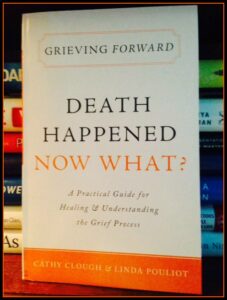
Let’s Be Honest
Even when we are not dealing with grief, we like to feel supported. This is because when we receive the support that we need we feel understood, safe, comforted, valued and sometimes even taken care of. Lack of support, on the other hand, can leave us feeling alone, frustrated, disconnected and maybe even angry. We frequently rely on family and friends for support after the death of a loved one. Sometimes they can give us what we need and other times they can’t. And friends and family members have their own lives—which they return to rather quickly. So, here we go. Healing Action Step: Find Support!
Finding Support
This is why attending a good grief support group is beneficial. However, I have to admit that I didn’t want to attend a grief support group. My mother and my friend Sandy irritated me to the point of frustration by calling me every week and sharing information about grief support groups around my town. They did this for approximately four months after my husband, Donald, died. I kept telling them that I didn’t want to share my business with anyone. And I don’t like to cry in front of people. Looking back now, I understand that I was in shock, too. I was adjusting to the fact that I had moved from having a physical relationship with Donald to one of memory. But a grief support group. Really? I wasn’t having it. And the truth be known I didn’t even know that there was such a thing as a grief support group until after his death. This was new and uncharted and stressful territory to me! Grief Support Group Guidelines
I Gave In
Finally, one dreary, snowy, Monday morning in February I gave in. Sandy called to tell me about a grief support group that was starting that night. And, at of all places my church! I told her that I couldn’t go because I didn’t register. She informed me that she had called, and registration was not necessary. I hung up. A few minutes later my mother called with information about the same grief support group. I couldn’t believe it. But I suddenly, I had a thought. I made a plan. I would go, at least once. Tell both of them I tried, and I just didn’t like it… And never go back.
I Circled the Parking Lot
I took the long way to the church that night. Then I drove around the parking multiple times before I parked my car. After I parked my car, I sat in the car for more than a few minutes, too. I could not believe that Donald was really dead, and I was at a grief support group. Eventually, I opened the car door, walked towards the building and made myself open the door to the building and walk in. I was greeted and escorted to the room at the end of a very long hallway.
What A Suprise
What a surprise! A new world opened up to me. There were people there who were just like me. Many of them talking openly about not wanting to be there and sharing that they couldn’t believe that they were actually at a grief support group. Over the next eight weeks we supported each other. We learned about the grief process, which is what’s normal for grief. Grieving. And we learned information that helped us to navigate our personal healing journey. Lifelong friendships developed and I was able to take what I was learning and use it immediately to help my grieving teenage children, too.
You Might Feel Worse, but It Will Get Better
If you haven’t done so already, consider attending a grief support group. Additionally, I have met many people, over the years who have found it beneficial to attend two or three different grief support groups the first few years after the death. This is an individual decision. It’s important to note that it’s normal to feel worse after attending the first few sessions and to not want to go back. This is because each session stirs up more grief pain and other issues that we need to sort out and process. This is all normal for grieving and healing. The recommendation is to attend at least three sessions before deciding to quit a group. Because usually by the third session you are fitting in and more comfortable being part of the group. However, if you find that the group is a good fit, try another group.
To find a grief support group in your area check with your local hospice and local churches.

